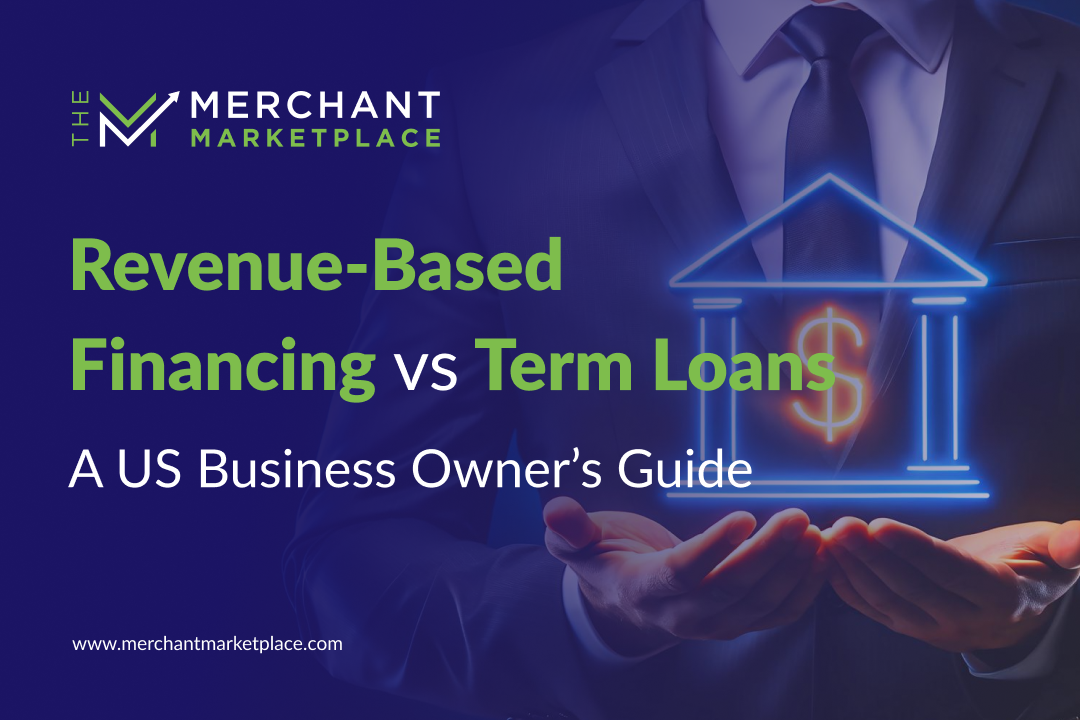Running a business this year in the U.S. economy isn’t everyone’s cup of tea. One would feel like trying to hit a moving target when trying to land funding for the business. Traditional loans, even though they have red tape, come with a sweet time, while Revenue-Based Financing (RBF) gives you a little more flexibility, but often with a higher price tag. So, if you’re building a SaaS company, running an e-commerce brand, or managing a seasonal gig, the real question is which option lines up best with your grind.
That’s where Merchant Marketplace steps in. It’s your shortcut to smart funding, connecting you with lenders who get your business. Whether you want the RBF or you’re eyeing a solid term loan, MMP cuts through the noise and gets you offers that actually make sense, fast.
What is Revenue-Based Financing (RBF)?
Revenue-based Financing is a setup where investors front you the capital in return for a slice of your future revenue. Unlike traditional loans with strict monthly payments, RBF moves with your business. When sales dip, your payments shrink too, keeping your cash flow steady and your stress levels low.
Benefits
RBF works best for businesses experiencing rapid growth or navigating seasonal fluctuations. It gives you:
- Flexible Repayments: It’s way easier to keep your cash flow steady when that slow season hits, as your payments move up and down with your revenue.
- No Equity Dilution: You stay in control and the full ownership of your business.
- Fast Capital Access: Get funds in as little as 24 hours instead of waiting weeks for traditional loans.
Common Industries Using RBF
RBF is popular among:
- SaaS Companies: Your recurring revenue fits perfectly with RBF’s flexible payment style.
- E-commerce Businesses: Ideal if your sales swing up and down month to month.
- Seasonal Ventures: Works well for businesses that hit big during certain seasons and slow down at others.
How MMP Facilitates Access to RBF Providers
Merchant Marketplace keeps it simple by breaking down rates, repayment plans, and fees so you can understand your options and letting you apply once to reach multiple lenders, saving time and hassle.
What is a Term Loan?
When you’re gearing up to grow or just trying to keep your business steady, term loans are your bet:
- Working Capital: Do the main things, such as keeping daily operations on track, covering payroll, rent, and short-term expenses, all without draining your cash flow.
- Equipment Purchase: An Efficient crew brings more profit. Use the funds to grab the machines, vehicles, or tech upgrades that make the work easy for your crew.
- Business Expansion: Next move is to open new locations, roll out products, or tap into new markets to push your business forward.
Ideal Use Cases
Term loans work best when you need cash for real business moves:
- Working Capital: Keep your day-to-day running without a hitch by covering payroll, rent, and other short-term costs, so your cash flow stays healthy.
- Equipment Purchase: Secure the cash to buy machines, vehicles, or tech upgrades that help your team work smarter and get more done.
- Business Expansion: Use funds to open new locations, launch products, or break into new markets, so your business keeps growing.
How MMP Helps Compare Term Loan Offers
Merchant Marketplace makes it easy by giving you access to multiple term loan lenders in one place, letting you compare rates, repayment terms, and fees, and streamlining applications so you can apply to several lenders at once without wasting time.
Key Differences Between RBF and Term Loans
| Feature | Revenue-Based Financing | Term Loan |
| Repayment Structure | Percentage of revenue | Fixed monthly payments |
| Risk | Lower for businesses with variable income |
Higher for businesses with inconsistent cash flow |
| Collateral | Not required | Often required |
| Qualifications | Based on revenue history |
Based on credit score and financial statements |
| Cash Flow Impact | Fluctuates with revenue | Fixed, regardless of revenue |
| Cost | Can be higher due to flexibility | Generally lower interest rates |
Merchant Marketplace lets you line up these options side by side, so you can quickly see which one fits your business best.
Pros and Cons of Revenue-Based Financing
Pros
- Pay Flexibly: Your payments change with your income, easing pressure when sales drop.
- Keep Ownership: You stay in full control, not giving up equity.
- Get Cash Fast: Money can reach you within a day.
Cons
- Higher Costs: Due to the flexibility and speed of funding.
- Not Great for Low Profits: The payback setup may not work well if your profit margins are tight.
Pros and Cons of Term Loans
Pros
- Steady Payments: Fixed monthly amounts make it simple to plan your budget.
- Possible Lower Rates: It can cost less if your credit record is strong.
- Trusted Option: A well-known lending type that many business owners rely on.
Cons
- Fixed Payback Plan: You pay the same amount even if sales go up or down.
- Tougher Approval Rules: Strong credit and more paperwork are usually needed.
- Might Need Collateral: You may have to pledge personal or business assets.
Which Option is Right for Your Business?
Think about these questions to find the right funding fit:
How Does Your Business Earn?
If your income stays steady and easy to predict, a term loan could be a good match. If it’s variable or seasonal, RBF offers more flexibility.
How Strong Is Your Credit?
If it’s solid, a term loan can get you lower rates. If not, revenue-based funding might be easier to qualify for.
What Do You Need Funding For?
If it’s for a big, one-time cost, a term loan could be the better choice. For ongoing working capital, RBF provides continuous funding.
Merchant Marketplace makes it easy to see your options for Revenue-Based Financing and Term Loans at once, with up-to-date rates and terms to help you pick what works best.
Conclusion
Now, when it comes to choosing between Revenue-Based Financing and a Term Loan, it depends on your business’s revenue model, credit history, and what you need funds for. If you need fast cash and flexibility, RBF is your thing, while term loans give a steady repayment process and pretty low interest rates. We simplify this process for you by offering a range of funding options and comparison tools, helping you find the best fit for your business.




